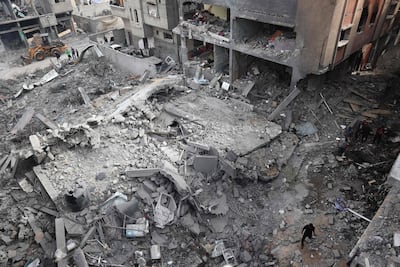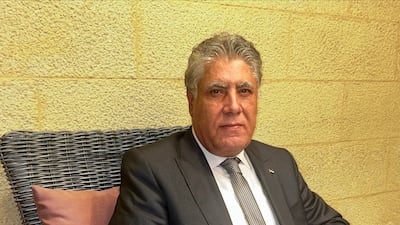Live updates: Follow the latest news on Israel-Gaza
After 21 years working at the UN Development Programme in Gaza, Basel Nasser now faces the task of assisting his birthplace on a scale unlike anything he has ever experienced before.
Eight months into Israel's military offensive in the Palestinian enclave, more than 37,000 residents have been killed, nearly 85,000 injured and most of its population of more than two million displaced by strikes and a ground offensive that have destroyed more than half of its buildings.
“The numbers don't even remotely reflect the reality,” Mr Nasser told The National before taking part in the UN emergency conference on Gaza's humanitarian needs, hosted by Jordan at the Dead Sea on Tuesday.
As Minister of Relief Affairs in the Palestinian Authority's newly appointed government – a position created in light of the war in Gaza – Mr Nasser is already planning for the rehabilitation of Gaza and its people once the war ends.
Unlike previous conflicts between Israel and Hamas in the coastal strip, “virtually the entire population of Gaza will require aid” this time, he said.
He pointed out that the death toll provided by Gaza's health authorities does not include those who have died from hunger or from the lack of proper medical care in the Strip.
Gaza's residents have faced acute food shortages created by strict Israeli controls on the delivery of aid since the war began, with UN and aid groups warning that the territory faces the risk of famine.
There are no fully functioning hospitals after most were destroyed in raids and bombardments by the Israeli military, while the few that are still in partial service struggle with shortages of medical supplies and fuel to run their generators.
Israel dropped about 70,000 tonnes of explosives on the Gaza Strip between the start of the war on October 7 and April 24, according to the Geneva-based Euro-Med Human Rights Monitor.
In addition to the grim human toll, damage to infrastructure totalled more than $18.5 billion by January, according to a World Bank and UN estimate.
Mr Nasser said the Palestinian government has put together an emergency plan for Gaza which will require at least $1.13 billion in assistance over the first six months after the fighting ends, as part of a larger project for relief and recovery.

The plan includes providing food, water and cash assistance for 300,000 families, and temporary shelters and other essentials for 30,000 families, as well as treatment for the ill and injured and psychological and psychosocial support for traumatised residents.
Teachers and temporary schools will be provided to allow children to resume their education, either remotely or in person.
“The matter requires sufficient funding,” Mr Nasser said. “If every person in Gaza was fed with just $5 a day, that's $11 million a day for the entire population.”
Unimpeded access to the territory, which has been under an Israeli blockade since Hamas seized control in 2007, will also be vital, including for machinery and materials need for reconstruction.
“The removal of rubble, which in and of itself is a mammoth task, will require intervention from private and public contractors both in Gaza and the occupied West Bank and the total free movement of machinery and equipment in and out of the strip,” Mr Nasser said.
The UN agency for Palestinian refugees, UNRWA, said on Monday that more than half of all buildings in Gaza had been destroyed, citing data from the UN Satellite Centre.
The task of reconstruction could take “up to 20 years”, even if funding was immediately available and with unrestricted access to the territory, said Mr Nasser.
“There is damage from the 2014 war that has not yet been repaired,” he said.
However, the question remains whether the Palestinian Authority will oversee Gaza's postwar recovery, as both Israel and Hamas, a rival of the Fatah political faction that controls the PA, are both opposed to this.
Still, Mr Nasser takes hope from the inclusion of eight members from Gaza, including himself, in the authority's 22-member cabinet.
“This is a strong indicator that the Palestinian Authority and the government will exert all efforts to take all the responsibilities to provide services, manage the relief, recovery and reconstruction process, and unify the Palestinian public institutions in the Gaza strip and the West Bank,” he said.
For Mr Nasser, who was trapped in Gaza for the first 40 days of the war before being allowed to leave – thanks to his Canadian passport – psychological support for Gazans will be a crucial part of the territory's rehabilitation.
“I was traumatised after only 40 days of war – but it has now already been months. There will be a lot of work to be done on that front,” he said.


